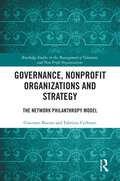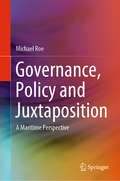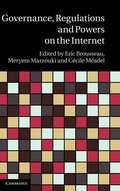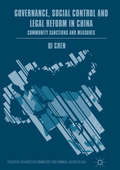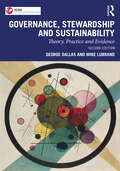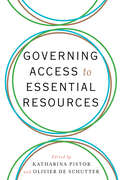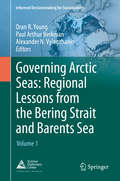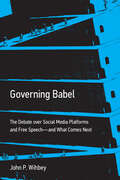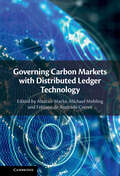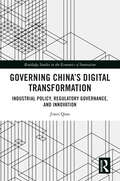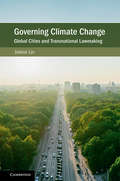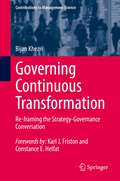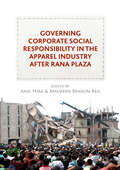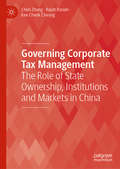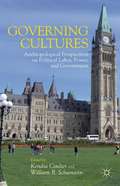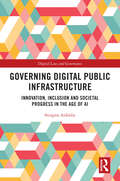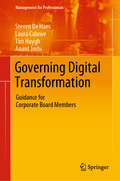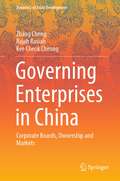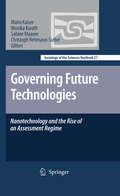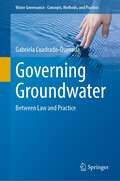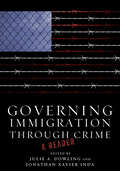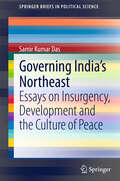- Table View
- List View
Governance, Nonprofit Organizations and Strategy: The Network Philanthropy Model (Routledge Studies in the Management of Voluntary and Non-Profit Organizations)
by Giacomo Boesso Fabrizio CerbioniGrant-making foundations play a crucial role in financing a wide range of philanthropic projects that contribute to the social and economic development of targeted communities. In fulfilling this essential function, the trustees who serve on each foundation's board of directors must ensure not only the economic and financial stability of their organization but also a balance with the expectations of the diverse social actors operating in the community, including associations, cooperatives, and operational foundations. This book identifies the features of the planning, programming, and controlling model of foundations that better facilitate a positive mediation between a strategic approach and civic dimensions. It offers insights and practical recommendations for designing governance and control mechanisms that promote transparency, accountability, and a network approach in the grant-making process and underscores the significance of a suitable governance framework in fostering trust and mutual understanding between foundations and their stakeholders. The guidance provided in this volume is based on rigorous research and real-world experiences, making it relevant and applicable to scholars and practitioners in the field. It serves as a valuable resource for those seeking to enhance the governance mechanisms within nonprofit organizations to maximize the impact of their philanthropic initiatives.
Governance, Policy and Juxtaposition: A Maritime Perspective
by Michael RoeThis book considers governance and policy-making within the maritime sector, and focuses significantly on the dimensional context within which governance works. Recognising the importance of understanding governance and policy at times when the world is faced with social, political, and economic problems, it highlights the fact that both areas are equally significant in understanding today’s political economy. By focusing on the maritime sector, a pillar industry supporting international trade activities, the book offers a unique perspective to explain the difficulties of balancing policy-making with governance in order to provide solutions. It also examines the importance of developing a governance process that encourages and accommodates juxtaposition in a way that ensures that the effect of independent policy-making is understood upon the success or otherwise of policies across a range of contexts and problems.Given the in-depth nature of the text, it is of interest to academics, researchers and professionals in the field.
Governance, Regulations and Powers on the Internet
by Eric Brousseau Meryem Marzouki Cécile Méadel"Digital technologies have prompted the emergence of new modes of regulation and governance, since they allow for more decentralized processes of elaboration and implementation of norms. Moreover, the Internet has been raising a wide set of governance issues since it affects many domains, such as individual rights, public liberties, property rights, economic competition, market regulation, conflict management, security and the sovereignty of states. There is therefore a need to understand how technical, political, economic and social norms are articulated, as well as to understand who the main actors of this process of transformation are, how they interact and how these changes may influence international rulings. This book brings together an international team of scholars to explain and analyse how collective regulations evolve in the broader context of the development of post-modern societies, globalization, the reshaping of international relations and the profound transformations of nation-states"--
Governance, Social Control and Legal Reform in China: Community Sanctions And Measures (Palgrave Advances in Criminology and Criminal Justice in Asia)
by Qi ChenThis book outlines how community sentences and early release options are administered in China. Chen provides empirical insights into the emerging community sector of the Chinese penal system, and illustrates how Chinese criminal courts decide between imprisonment and community sentences. Drawing on interviews with government and non-governmental supervisors, this methodological and rigorous study offers an in-depth discussion of the enforcement of these community sanctions and measures (CSM). By using the CSM reform as an example, this book illustrates the adaptation of Chinese governance and social control. Ultimately, Chen argues that the current model of governance in China (disciplinary governance) cannot guarantee an effective state-agent relationship; it also denies local governments sufficient legitimacy to secure social stability. Finally, proposing that only the rule of law and an active judiciary can complement these two deficiencies, this book will be of great interest to scholars of criminology, law, and penology, as well as anyone who is interested in how China is held together in a socio-legal sense.
Governance, Stewardship and Sustainability: Theory, Practice and Evidence
by George Dallas Mike LubranoThe first introductory practical guide of its kind, this book brings together principles of corporate governance, investor stewardship and enterprise sustainability in the context of institutional investment. Stewardship codes are developing in diverse markets to provide a framework for responsible institutional investment practices and fiduciary duties for beneficiaries. While codes provide a starting point, the application of stewardship in practical terms can be challenging for many institutional investors. Written by two well-known corporate governance experts, George Dallas and Mike Lubrano, and based on the ICGN training course on stewardship that they developed, this book gives needed clarity, rigor and guidance to practitioners about what we know—and don't know—about stewardship, governance and sustainability. It explores the theoretical foundations of stewardship, linking these to day-to-day decision-making and providing real-life examples and practical tools to evaluate issues that arise for companies from an environmental, social and governance perspective and generate ideas about how to make investor stewardship a practical reality in similar cases. Investor stewardship and ESG professionals, portfolio managers, senior managers, regulators and finance students will appreciate this unique guide to developing, refining and operationalising investor stewardship capabilities in line with the respected and internationally recognised ICGN policy framework.
Governing Access to Essential Resources
by Olivier Katharina Pistor De SchutterEssential resources do more than satisfy people's needs. They ensure a dignified existence. Since the competition for essential resources, particularly fresh water and arable land, is increasing and standard legal institutions, such as property rights and national border controls, are strangling access to resources for some while delivering prosperity to others, many are searching for ways to ensure their fair distribution.This book argues that the division of essential resources ought to be governed by a combination of Voice and Reflexivity. Voice is the ability of social groups to choose the rules by which they are governed. Reflexivity is the opportunity to question one's own preferences in light of competing claims and to accommodate them in a collective learning process. Having investigated the allocation of essential resources in places as varied as Cambodia, China, India, Kenya, Laos, Morocco, Nepal, the arid American West, and peri-urban areas in West Africa, the contributors to this volume largely concur with the viability of this policy and normative framework. Drawing on their expertise in law, environmental studies, anthropology, history, political science, and economics, they weigh the potential of Voice and Reflexivity against such alternatives as pricing mechanisms, property rights, common resource management, political might, or brute force.
Governing Access to Essential Resources
by Olivier De Schutter Katharina PistorEssential resources do more than satisfy people's needs. They ensure a dignified existence. Since the competition for essential resources, particularly fresh water and arable land, is increasing, and standard legal institutions, such as property rights and national border controls, are strangling access to resources for some while delivering prosperity to others, many are searching for ways to ensure their fair distribution. This book argues that essential resources ought to be governed by a combination of Voice and Reflexivity. Voice is the ability of social groups to choose the rules by which they are governed. Reflexivity is the opportunity to question one's own preferences in light of competing claims and to accommodate them in a collective learning process. Having investigated the allocation of essential resources in places as varied as Cambodia, China, India, Kenya, Laos, Morocco, Nepal, the arid American West, and peri-urban areas in West Africa, the contributors to this volume largely concur with the viability of this policy and normative framework. Drawing on their expertise in law, environmental studies, anthropology, history, political science, and economics, they weigh the potential of Voice and Reflexivity against such alternatives as the pricing mechanism, property rights, common resource management, political might, or brute force.
Governing Arctic Seas: Volume 1 (Informed Decisionmaking for Sustainability)
by Oran R. Young Paul Arthur Berkman Alexander N. VylegzhaninGoverning Arctic Seas introduces the concept of ecopolitical regions, using in-depth analyses of the Bering Strait and Barents Sea Regions to demonstrate how integrating the natural sciences, social sciences and Indigenous knowledge can reveal patterns, trends and processes as the basis for informed decisionmaking. This book draws on international, interdisciplinary and inclusive (holistic) perspectives to analyze governance mechanisms, built infrastructure and their coupling to achieve sustainability in biophysical regions subject to shared authority. Governing Arctic Seas is the first volume in a series of books on Informed Decisionmaking for Sustainability that apply, train and refine science diplomacy to address transboundary issues at scales ranging from local to global. For nations and peoples as well as those dealing with global concerns, this holistic process operates across a ‘continuum of urgencies’ from security time scales (mitigating risks of political, economic and cultural instabilities that are immediate) to sustainability time scales (balancing economic prosperity, environmental protection and societal well-being across generations). Informed decisionmaking is the apex goal, starting with questions that generate data as stages of research, integrating decisionmaking institutions to employ evidence to reveal options (without advocacy) that contribute to informed decisions. The first volumes in the series focus on the Arctic, revealing legal, economic, environmental and societal lessons with accelerating knowledge co-production to achieve progress with sustainability in this globally-relevant region that is undergoing an environmental state change in the sea and on land. Across all volumes, there is triangulation to integrate research, education and leadership as well as science, technology and innovation to elaborate the theory, methods and skills of informed decisionmaking to build common interests for the benefit of all on Earth.
Governing Babel: The Debate over Social Media Platforms and Free Speech--and What Comes Next
by John P. WihbeyWhy social media platforms have a responsibility to look after their platforms, how they can achieve the transparency needed, and what they should do when harms arise.The large, corporate global platforms networking the world&’s publics now host most of the world&’s information and communication. Much has been written about social media platforms, and many have argued for platform accountability, responsibility, and transparency. But relatively few works have tried to place platform dynamics and challenges in the context of history, especially with an eye toward sensibly regulating these communications technologies.In Governing Babel, John Wihbey articulates a point of view in the ongoing, high-stakes debate over social media platforms and free speech about how these companies ought to manage their tremendous power.Wihbey takes readers on a journey into the high-pressure and controversial world of social media content moderation, looking at issues through relevant cultural, legal, historical, and global lenses. The book addresses a vast challenge—how to create new rules to deal with the ills of our communications and media systems—but the central argument it develops is relatively simple. The idea is that those who create and manage systems for communications hosting user-generated content have both a responsibility to look after their platforms and have a duty to respond to problems. They must, in effect, adopt a central response principle that allows their platforms to take reasonable action when potential harms present themselves. And finally, they should be judged, and subject to sanction, according to the good faith and persistence of their efforts.
Governing Carbon Markets with Distributed Ledger Technology
by Alastair Marke Michael A. Mehling Correa, Fabiano de AndradeCarbon markets involve complex governance challenges, such as ensuring transparency of emissions, facilitating as well as recording transactions, overseeing market activity and preventing abuse. Conventionally, these have been addressed with a combination of regulatory, procedural and technical structures that impose significant burdens on market participants and administrators while remaining vulnerable to system shocks and illicit practices. Distributed Ledger Technology (DLT) has the potential to address these problems. This volume offers the first book-length exploration of how carbon markets can be governed using DLT, offering conceptual and theoretical analysis, practical case studies, and a roadmap for implementation of a DLT-based architecture in major existing and emerging carbon markets. It surveys existing expertise on distributed ledger technology, provides progress updates from industry professionals, and shows how this technology could offer a cost-effective and sustainable solution to double-counting and other governance concerns identified as major challenges in the implementation of carbon markets.
Governing China's Digital Transformation: Industrial Policy, Regulatory Governance, and Innovation (Routledge Studies in the Economics of Innovation)
by Jiwei QianThis book examines China’s digital transformation and its complex policy landscape, offering fresh insights into how the world’s second-largest economy navigates the challenges of governing its rapidly evolving digital sector. Through detailed analysis, it reveals the intricate relationship between technological innovation and policy implementation in contemporary China.The book explores critical themes including digital industrial policies, competition policy, data governance, and artificial intelligence development. It introduces two dynamics: the “digital amplification of fragmentation,” which explains how digital technologies intensify existing governance challenges, and the “technology-policy recursive loop,” which describes the interaction between technological advancement and regulatory responses. Using diverse data sources and covering developments such as China’s 2020–2021 regulatory crackdown of major technology firms like Alibaba and Tencent, the book provides a comprehensive examination of China’s unique approach to digital governance. Special attention is paid to pressing issues such as data security, cross-border data flows, and technological self-reliance.An essential read for policymakers, business leaders, and scholars seeking to understand China’s digital economy and its implications for global digital governance. Its accessible analysis offers valuable insights for anyone interested in the intersection of technology, policy, and economic development in contemporary China.
Governing Climate Change: Global Cities and Transnational Lawmaking (Cambridge Studies on Environment, Energy and Natural Resources Governance)
by Jolene LinCities are no longer just places to live in. They are significant actors on the global stage, and nowhere is this trend more prominent than in the world of transnational climate change governance (TCCG). Through transnational networks that form links between cities, states, international organizations, corporations, and civil society, cities are developing and implementing norms, practices, and voluntary standards across national boundaries. In introducing cities as transnational lawmakers, Jolene Lin provides an exciting new perspective on climate change law and policy, offering novel insights about the reconfiguration of the state and the nature of international lawmaking as the involvement of cities in TCCG blurs the public/private divide and the traditional strictures of 'domestic' versus 'international'. This illuminating book should be read by anyone interested in understanding how cities - in many cases, more than the countries in which they're located - are addressing the causes and consequences of climate change.
Governing Continuous Transformation: Re-framing the Strategy-Governance Conversation (Contributions to Management Science)
by Bijan KhezriThis book transposes the ‘free-energy principle’, as espoused by the neuroscientist Karl Friston, to strategic governance, and forming the new concept of Free-Energy Governance (FEG). This concept lays the foundation for a new logic of governing continuous transformation. In addition to guiding the structure, cognition, and capabilities of success in strategic renewal, FEG provides a systematic and practice-relevant approach to predicting a firm’s potential for entropy.Using this new concept, the author shows that the success of continuous strategic renewal and business innovation, elements crucial for firm survival, are determined by the triplet of a firm’s structure, cognition, and dynamic board capabilities. “How to govern large organizations in times of high uncertainty and permanent change? To answer this pressing question, … Bijan Khezri has been the first to apply [the free energy] principle to management science … This book is an eyeopener for every reflective leader.¨ Professor Oliver Gassmann, Director of the Institute of Management and Technology, University of St. Gallen “I really enjoyed reading this book. It was both exciting and reassuring to see how the same fundamental ideas can be found in fields as disparate as nonequilibrium steady-state physics and theories of governance.” Professor Karl. J. Friston; Director of the Wellcome Centre for Human Neuroimaging “Using a term often applied to best-selling novels, ‘it is a page turner’ in which I learned something new in every chapter! Every board member, all executives and scholars interested in strategic leadership and governance must read this book if they wish to remain relevant in the coming transformational decades.” Michael A. Hitt University Distinguished Professor Emeritus, Mays Business School, Texas A&M University Former President, Academy of Management, and former Editor, Academy of Management Journal "We could not ask for a better author to initiate this new conversation in the board research community and convey its merits to the world of board practice." Martin HilbProfessor Emeritus, University of St. Gallen Founder and Managing Partner, International Board Foundation and President of Swiss Institute of Directors “Set against a wide swath of literature, the book impressively makes the case for a new logic of strategic renewal in which the board of directors plays a central role.” Professor Constance E. Helfat, Tuck School of Business at Dartmouth
Governing Corporate Social Responsibility in the Apparel Industry after Rana Plaza
by Anil Hira Maureen Benson-ReaThis edited collection critically explores the efforts of the apparel industry to improve safety conditions and suggests governance reforms that will resolve lingering issues. The volume examines two consortia: the Alliance and the Accord, which set up cooperative auditing systems of supplying factories and penalties for non-compliance, and include funding to help factories comply and for workers if factories are idled during repairs, though the editors raise doubts about the long-lasting value of such efforts. In the wake of the 2013 Rana Plaza disaster, leading researchers across labor relations and industry studies tackle and debate such issues, giving their perspective of how multinationals operating in developing countries should regulate labor standards in order to resolve and improve the substandard working conditions under which much of our clothing is made.
Governing Corporate Tax Management: The Role of State Ownership, Institutions and Markets in China
by Rajah Rasiah Kee Cheok Cheong Chen ZhangThis book focuses on corporate sector development in the context of transition economies, such as China. In doing so, the book uses quantitative methods to test several hypotheses that are salient to the Chinese economic situation.Topics covered in the book include the relationship between tax management and firm performance, the extent to which a short-term focus on tax management can lead to long-term vulnerabilities, the impact of government ownership on tax management impact, and the link between the co-evolution of marketization and corruption, and institutional change and tax management.With that the book offers rich empirical evidence to examine tax management, firm performance and corruption in a broad context, while permitting comparison between the Chinese experience and the market economies.
Governing Cultures
by Kendra Coulter William R. SchumannBy assembling original, ethnographically-grounded research in legislatures, executives, and bureaucracies, this volume illuminates and unpacks the structures, practices, and values of government actors in local, regional, and national contexts.
Governing Digital Public Infrastructure: Innovation, Inclusion and Societal Progress in the Age of AI (Digital Law and Governance)
by Stergios AidinlisThis book explores how digital public infrastructures (DPI) should be governed in the public interest, harnessing their potential to drive innovation, inclusion, and societal progress in the age of supercomputers and generative AI.DPI – from hardware and software to data and networks – are becoming increasingly critical to our economy, society, and daily lives. As the AI revolution unfolds, the governance of these infrastructures is coming under scrutiny, with questions arising about how to balance innovation, access, and the public interest. Examining the potential for DPI to empower citizen-entrepreneurs, researchers, small businesses, and the public sector, the book analyses the legal frameworks governing DPI access. Covering key areas such as AI law, data protection, IP law, and competition law, the book emphasizes the need for inclusive and participatory governance models that prioritize transparency, accountability, and the public good. It offers actionable recommendations for policymakers, businesses, civil society, and researchers to collaborate in shaping the future of DPI governance.The book will be of interest to researchers in the field of digital law, digital governance, and public law.
Governing Digital Transformation: Guidance for Corporate Board Members (Management for Professionals)
by Anant Joshi Tim Huygh Steven De Haes Laura CaluweThis title provides clear and readily applicable guidance to corporate board members on the involvement of boards of directors in information technology (IT) governance. Specifically, it demonstrates ways in which board members can execute IT duties effectively. Specific tools such as a roadmap towards digital transformation and a board-level dashboard for digital strategy and oversight are also offered. While organizations are increasingly dependent on IT for the creation of business value, the evidence seems to indicate that boards of directors are not as involved in IT-related strategic decision-making and control as they should be. Research shows that high levels of board-level IT governance, regardless of existing IT needs, will improve organizational performance. This book provides unique insights into the inner workings of a specific board of directors group, with a focus on its IT governance structures and processes.
Governing Digitally Integrated Genetic Resources, Data, and Literature
by Tom Dedeurwaerdere Paul F. Uhlir Reichman, Jerome H. and Uhlir, Paul F. and Dedeurwaerdere, Tom Jerome H. ReichmanThe free exchange of microbial genetic information is an established public good, facilitating research on medicines, agriculture, and climate change. However, over the past quarter-century, access to genetic resources has been hindered by intellectual property claims from developed countries under the World Trade Organization's TRIPS Agreement (1994) and by claims of sovereign rights from developing countries under the Convention on Biological Diversity (CBD) (1992). In this volume, the authors examine the scientific community's responses to these obstacles and advise policymakers on how to harness provisions of the Nagoya Protocol (2010) that allow multilateral measures to support research. By pooling microbial materials, data, and literature in a carefully designed transnational e-infrastructure, the scientific community can facilitate access to essential research assets while simultaneously reinforcing the open access movement. The original empirical surveys of responses to the CBD included here provide a valuable addition to the literature on governing scientific knowledge commons.
Governing Enterprises in China: Corporate Boards, Ownership and Markets (Dynamics of Asian Development)
by Rajah Rasiah Kee Cheok Cheong Zhang ChengThis book examines the nature of the marketization of corporate boards following the introduction of the split share reform, corporate board and shareholder relations, corporate performance, and risk-taking conduct in China. The chapters cover topics such as determinants of corporate board size and independence, corporate risk-taking conduct under different controlling shareholder types. The book deepens our understanding of corporate governance mechanisms as most previous studies have limited their findings using mainstream perspectives grounded on neoclassical theory. It outlines that China’s corporate board composition is determined by the board’s scope of operation, monitoring, bargaining power, and other governance mechanisms and regulations. It also offers a comparison between China’s experience with other economies in general and other transition economies in particular. As such, the book represents an essential overview of the current concerns regarding corporate governance in China. It is of great interest to legal researchers, policymakers, and legal practitioners working with business investments in China.
Governing Failure
by Jacqueline BestJacqueline Best argues that the changes in International Monetary Fund, World Bank and donor policies in the 1990s, towards what some have called the 'Post-Washington Consensus,' were driven by an erosion of expert authority and an increasing preoccupation with policy failure. Failures such as the Asian financial crisis and the decades of despair in sub-Saharan Africa led these institutions to develop governance strategies designed to avoid failure: fostering country ownership, developing global standards, managing risk and vulnerability and measuring results. In contrast to the structural adjustment era when policymakers were confident that they had all the answers, the author argues that we are now in an era of provisional governance, in which key actors are aware of the possibility of failure even as they seek to inoculate themselves against it. This book considers the implications of this shift, asking if it is a positive change and whether it is sustainable.
Governing Future Technologies
by Christoph Rehmann-Sutter Sabine Maasen Mario Kaiser Monika KurathNanotechnology has been the subject of extensive 'assessment hype,' unlike any previous field of research and development. A multiplicity of stakeholders have started to analyze the implications of nanotechnology: Technology assessment institutions around the world, non-governmental organizations, think tanks, re-insurance companies, and academics from science and technology studies and applied ethics have turned their attention to this growing field's implications. In the course of these assessment efforts, a social phenomenon has emerged - a phenomenon the editors define as assessment regime. Despite the variety of organizations, methods, and actors involved in the evaluation and regulation of emerging nanotechnologies, the assessment activities comply with an overarching scientific and political imperative: Innovations are only welcome if they are assessed against the criteria of safety, sustainability, desirability, and acceptability. So far, such deliberations and reflections have played only a subordinate role. This book argues that with the rise of the nanotechnology assessment regime, however, things have changed dramatically: Situated at the crossroads of democratizing science and technology, good governance, and the quest for sustainable innovations, the assessment regime has become constitutive for technological development. The contributions in this book explore and critically analyse nanotechnology's assessment regime: To what extent is it constitutive for technology in general, for nanotechnology in particular? What social conditions render the regime a phenomenon sui generis? And what are its implications for science and society?
Governing Groundwater: Between Law and Practice (Water Governance - Concepts, Methods, and Practice)
by Gabriela Cuadrado-QuesadaThis book empirically examines a diverse range of groundwater issues and different approaches to deal with such concerns taking into account responses from government bodies, community organizations, scientists, private sector, and academia. The overarching objective of this book is to empirically examine groundwater governance and groundwater law. It aims to provide a better understanding of the complexities surrounding groundwater governance in order to reconceptualize and retheorize the governance of subterranean resources having as entry points equity and sustainability concerns. This involves understanding what people do when using, sharing, protecting, and measuring groundwater; and why do they do what they do, i.e., what are their motivations to resort to certain practices. This is done through the comparative and contrasting investigation of six case studies from countries from the Global North and Global South. It offers a different perspective of literature given that it explains how groundwater governance and law are in practice rather than what they should be. Additionally, the research presented in this book provides ideas on how to rethink the design and implementation of groundwater law grounded on empirically based descriptions and the understanding of groundwater problems.
Governing Immigration Through Crime: A Reader
by Julie A. Dowling Jonathan Xavier IndaIn the United States, immigration is generally seen as a law and order issue. Amidst increasing anti-immigrant sentiment, unauthorized migrants have been cast as lawbreakers. Governing Immigration Through Crime offers a comprehensive and accessible introduction to the use of crime and punishment to manage undocumented immigrants. Presenting key readings and cutting-edge scholarship, this volume examines a range of contemporary criminalizing practices: restrictive immigration laws, enhanced border policing, workplace audits, detention and deportation, and increased policing of immigration at the state and local level. Of equal importance, the readings highlight how migrants have managed to actively resist these punitive practices. In bringing together critical theorists of immigration to understand how the current political landscape propagates the view of the "illegal alien" as a threat to social order, this text encourages students and general readers alike to think seriously about the place of undocumented immigrants in American society.
Governing India's Northeast
by Samir Kumar DasThis book focuses on issues of governance and the nature and complexities of social transformation in India's Northeast -- a 'problem' zone for policymakers -- particularly since the early 1990s. While governance is the thread that runs through the volume, the latter at one level addresses the challenges of governing in global times a region historically marked by acute violence, interethnic conflict and insurgency; and at another, traces macro changes in the very forms and technologies of governance. The essays in this volume point to how changing forms and technologies of governing insurgency, development and culture do not remain mere instruments of peace, but define the very nature and content of both peace and conflict and their interrelationship in the region.For the first time in the history of scholarship on the region, the three crucial issues of insurgency, development and culture have been analysed through the lens of governance. This volume, therefore, marks an important addition to the scholarship on the region.
